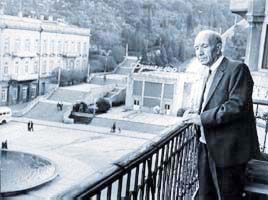
Autumn 1998 (6.3)
Mir Jalal (1908-1978)
90th
Jubilee
by his son, Hafiz Pashayev,
Azerbaijan's Ambassador to the U.S.

 It's only natural
for a child to endear himself to the memories of his father.
Though my father died 20 years ago, I still feel his spirit with
me. As time passes, the memories, the conversations and all those
events we shared together tend to blur while taking on a rather
divine characteristic of their own.
It's only natural
for a child to endear himself to the memories of his father.
Though my father died 20 years ago, I still feel his spirit with
me. As time passes, the memories, the conversations and all those
events we shared together tend to blur while taking on a rather
divine characteristic of their own.
Mir Jalal, author of short
stories that poked fun at Soviet bureaucracy. Here he is standing
on the balcony of his apartment complex--the setting for "Scoldings."
Also
see short stories by Mir Jalal
Many details of my father's life are reflected in the stories
he wrote. Whenever he encountered an interesting event or person,
he would say, "Now, that would make a good story!"
or "That's a story in itself!" And I could be sure
that next morning a story would be waiting for me to run down
to the Writers Union so that his secretaries could type it.
Many people have observed that
Mir Jalal was able to combine authorship, scholarship and teaching
into a single career. Though success in any one of these fields
would have secured him a place in the cultural history of Azerbaijan,
he succeeded in all three. Some people thought writing came easy
to him, but there was more to it - untiring dedication, an active
mind and talent.
During decades of teaching at
Baku State University, Mir Jalal's students used to ask him about
his scholarly and creative works, wondering which he regarded
as his masterpiece. "My greatest achievement in life,"
he would tell them, "is my family." Mir Jalal had been
separated from his own family in his youth when they returned
to Iranian (Southern) Azerbaijan, and he continued high school
in Northern Azerbaijan (at that time Soviet Azerbaijan and today,
the Independent Republic of Azerbaijan).
My father had three sons and
two daughters. His wife Pusteh Khanim (who is still with us)
was his life-long partner. Mir Jalal always tried to set an example
for his children and students.
He chose friends for their ideas
and outlook on life, not because of their status or Party affiliation.
His life as well as his stories are filled with simplicity and
naturalness, unpretentiousness and modesty. He never wanted to
bother anyone or have to depend on anyone - even his own children.
He always used to walk to work. When questioned why he didn't
drive, he would counter, "But I have the keys to all the
cars in Baku," and would pull out a bill, the equivalent
of a taxi fare.
After completing high school
(1958), I often talked with my father about which university
field to enter. Though I was inclined towards the sciences, I
did have an inkling for writing as perhaps is only natural for
someone growing up in a family of writers, but my father discouraged
me. For him, the 20th century was the age of science and technology
and thus I became a physicist.
Mir Jalal did his best to avoid
any involvement with Soviet administrative offices. Whenever
it was necessary to get involved, he would ask one of his students
to go in his place. One of his students recalled Mir Jalal saying,
while passing the Central Administration Office of Baku one day,
"Thank God, I don't have anything to do with this place."
Of course, his satires such as "Anket Anketov" or "Dried-Up
in Meetings" clearly point out the destructive nature of
the Soviet bureaucracy, especially under Stalin in the 1930s
and 1940s.
I'll never forget in 1976, when
I returned to Baku from studying advanced physics at the University
of California (Irvine). I well remember the day when my father
called me into his room and asked me to tell him my impressions
of America. At first he listened to me quietly. Then after asking
a few questions, he said, "I figured America would be just
as you have described it." He cautioned me not to speak
openly about my experiences. His generation had lived through
the purges of Stalin and Bagirov [Stalin's representative in
Azerbaijan]. It was difficult for him not to be fearful.
In the 1970s, the economic situation
in the Soviet Union worsened and Mir Jalal posed the rhetorical
question: "What will happen to the Soviet Union in the future?"
I'm sorry that he did not live long enough to answer his own
question. No doubt, he would have been proud that his pen so
accurately pinpointed some of the incongruities and ironies that
led to its disintegration.
The story that follows, "Used
to Scoldings" is based on fact. It took place in the apartment
building in which we lived. It reflects a mentality that the
Soviet system fostered - to always expect a scolding, even when
things were going fine. Unfortunately, this aspect of the Soviet
legacy is still with us today.
Home | About
Azeri | Learn
Azeri | Arabic
Script | Store | Contact
us
Articles from Azerbaijan
International
© Azerbaijan International. Copyright 2002. All rights reserved.
|
|